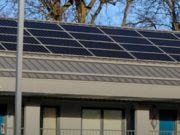Energy Management
Home Energy Management
 Everyone has felt the sting of rising energy costs recently. Savvy hoteliers have implemented plans to address these increases. It could be a simple operational change or a complex capital investment. Green Lodging News covers the latest news and trends pertaining to energy management. Got news or a story idea to share? Contact Glenn Hasek, editor, at (813) 510-3868, or by e-mail at: greenlodgingnews@gmail.com.
Everyone has felt the sting of rising energy costs recently. Savvy hoteliers have implemented plans to address these increases. It could be a simple operational change or a complex capital investment. Green Lodging News covers the latest news and trends pertaining to energy management. Got news or a story idea to share? Contact Glenn Hasek, editor, at (813) 510-3868, or by e-mail at: greenlodgingnews@gmail.com. Big News Week with Google Now Identifying Many Certified Green Hotels
It was a big news week this past week with numerous announcements of interest. First, according to Bloomberg, beginning on September 22, Google began labeling hotels as “Eco-Certified” in its global search results, with a leaf-shaped icon next to the hotel’s name. “Clicking on the ‘About’ tab will detail the property’s specific sustainability practices, such as having water use audited by an independent organization or using energy from carbon-free sources,” Bloomberg says.
“The new feature relies on 29 certification programs to do the hard work of establishing a hotel’s green credibility; the property must have an array of sustainability measures...
Cornell Hotel School Report Reveals Continued Carbon Footprint Reduction in Hotels Around the World
Average carbon footprint of a hotel stay decreased by 3 percent in 2019.
Includes data on energy, carbon, and water from 21,000 hotels across 57 countries.
Online tool to support calculation of carbon footprint of hotel stays.
Data from the latest Cornell Hotel Sustainability Benchmarking (CHSB) Index shows that the average carbon footprint of a hotel stay decreased by 3 percent between 2018 and 2019, following a decrease of 10 percent between 2015 and 2018.
The report contains data from over 21,000 hotels in 57 countries and 365 cities from the 26 global brands, which participated in the study.
The greatest...
Kentucky’s Renovated Envi Boutique Hotel Has Come a Long Way Since It First Opened in 1967
HENDERSON, KY.—The Envi Boutique Hotel, located in Henderson, Kentucky, is proof that an old, tired hotel that has seen its share of flags can not only survive but thrive as a shiny, totally renovated green hotel striving to be greener.
According to Kiran Patel, owner of the property, the 54-room hotel was first opened in 1967 as a full-service Holiday Inn. It later was converted to a Best Western and finally two other brands before being renovated into the Envi Boutique Hotel in June of this year. “In 1994 we purchased the property and was with Super 8 for 23.5...
Tax Incentives for Energy That are Clean, Green, & Renewable
NATIONAL REPORT—The Tax Code has long been used to help achieve various societal goals, one of which is the more efficient use of energy by individuals and businesses. It’s also long been used to promote energy production, to help achieve energy independence, and in more recent years to promote renewable and clean energy production. These tax provisions change frequently to try to keep up with the latest technologies and encourage individuals and businesses to make their homes, vehicles, and businesses more energy efficient while also encouraging the energy industry to address various specific aspects of energy production. The current...
Cintas Goal: Net Zero GHG Emissions by 2050
CINCINNATI—Cintas Corp. announced its ambition to achieve Net Zero greenhouse gas (GHG) emissions by 2050.
The company is also in the midst of a comprehensive, enterprise-wide review of its business model as it relates to environmental, social and governance (ESG) opportunities, improvements, and efficiencies. Cintas has been built on sustainable business practices, and the continuous improvement of its sustainability measures has been key to the company’s operational success over the years.
As its business review continues for the next 12 to 18 months, Cintas expects to better define its ESG journey, including identifying strategies to reduce its Scope 1 and 2...
International Code Council Launches ‘Code on a Mission’ Challenge Urging Adoption of Modern Energy Efficiency Codes
WASHINGTON, D.C.—The International Code Council—the leading global source of model codes and standards and building safety solutions—launched its “Code on a Mission” challenge which aims to have over a third of the U.S. population covered by the 2021 International Energy Conservation Code (IECC) by the end of 2023. To make this a reality, the Code Council is challenging the building industry and communities alike to update their building energy codes to meet or exceed the requirements of the 2021 IECC. Already industry leaders like Architecture 2030, the Institute for Market Transformation (IMT), Energy Efficient Codes Coalition (EECC), Northeast Energy Efficiency...
DuPont Publishes Environmental Product Declaration for New Insulation
WILMINGTON, DEL.—With the release of the latest landmark climate report by the United Nations’ Intergovernmental Panel on Climate Change (IPCC), DuPont announced it is even more urgent that architects, policymakers and industry work together to limit the impact of global warming, and reduce embodied carbon.
Affirming its commitment to transparency, DuPont Performance Building Solutions has published an Environmental Product Declaration (EPD) for its newest Styrofoam Brand ST-100 Series extruded polystyrene insulation (XPS). This latest EPD continues the company’s practice of publishing third-party-verified EPDs for Styrofoam Brand products sold in North America, including its reduced and low global warming potential (GWP) products introduced in 2021 to help architects...
Picking the Brain of a Smart Buildings Expert
Commercial buildings, including hotels in the United States, waste up to $60 billion in energy every year. That is not a good record, especially since by 2050, every building in the world will need to achieve the target goal of net-zero energy use to avoid the worst impacts of climate change.
Given that most buildings that will exist in the next 30 years have already been built, the only way to get there is more technology and digitization of buildings and the built environment. So says Paul Ghezzi, CEO and Director of Kontrol Technologies, whose company’s aim is to make...
Japan Hotel Run by Electricity Generated from Hydrogen, Food Waste
KAWASAKI CITY, JAPAN—In any conversation about green hotels, one of the hotels that deserves a lot of time is the Kawasaki King Skyfront Tokyu REI Hotel in Kawasaki City, Japan. The 186-room property is run by 100 percent renewable energy. Thirty percent of the energy is derived from hydrogen. Seventy percent of the energy is derived from food waste generated renewable energy. Since transitioning to 100 percent renewable energy the hotel has saved more than $15,000 per year.
To generate hydrogen, used plastics (household plastic trash plus hotel amenities) are sent to Showa Denko K.K.’s hydrogen production facility where they...
How Monsoon Storms Can Impact Your Commercial HVAC Unit
Monsoon season excites many residents and tourists during the summer, but hotel operators and building owners must recognize that monsoon season can pose serious threats to people and property. This year, unpredictable and intense monsoons have been sweeping the southwestern United States, increasing the amount of dust and debris particles in the air which can decrease the performance and efficiency of air conditioning units. Not only does this reduce the level of comfort in the building, but it also impacts the quality of the indoor air your employees and guests breathe.
It’s no surprise your building’s commercial HVAC unit is...









